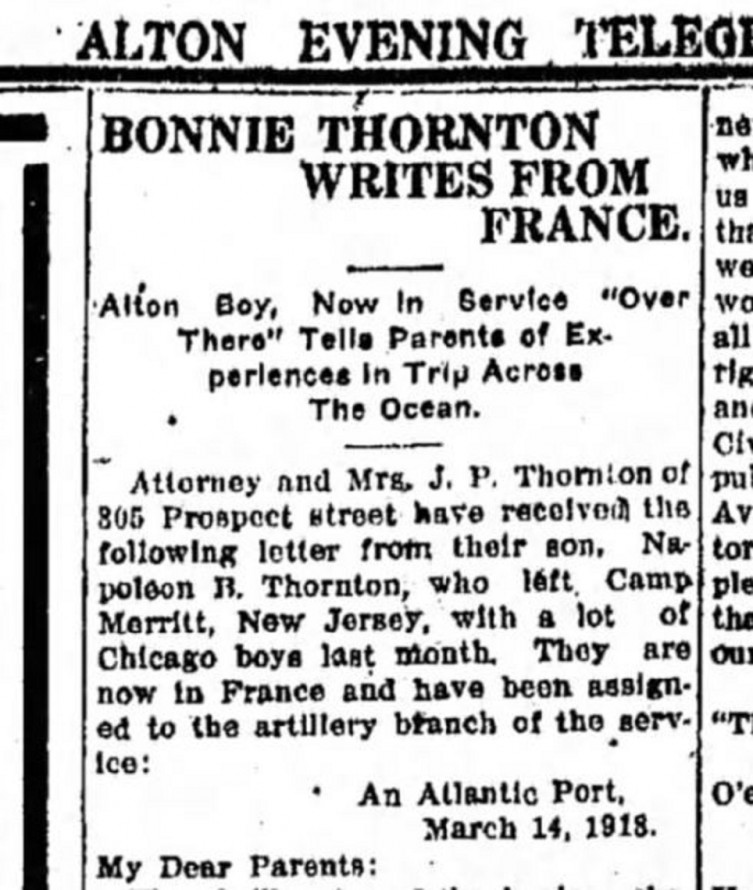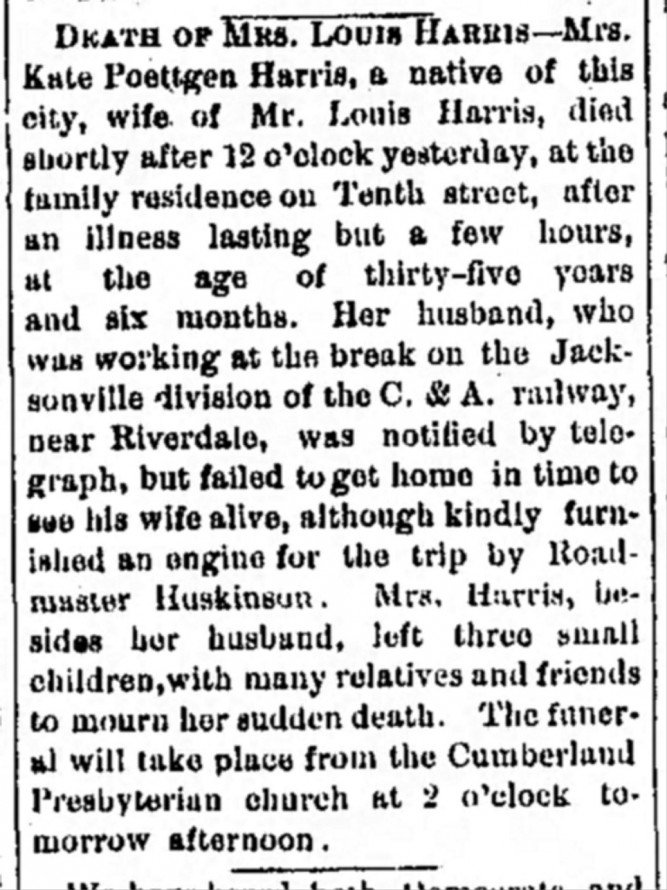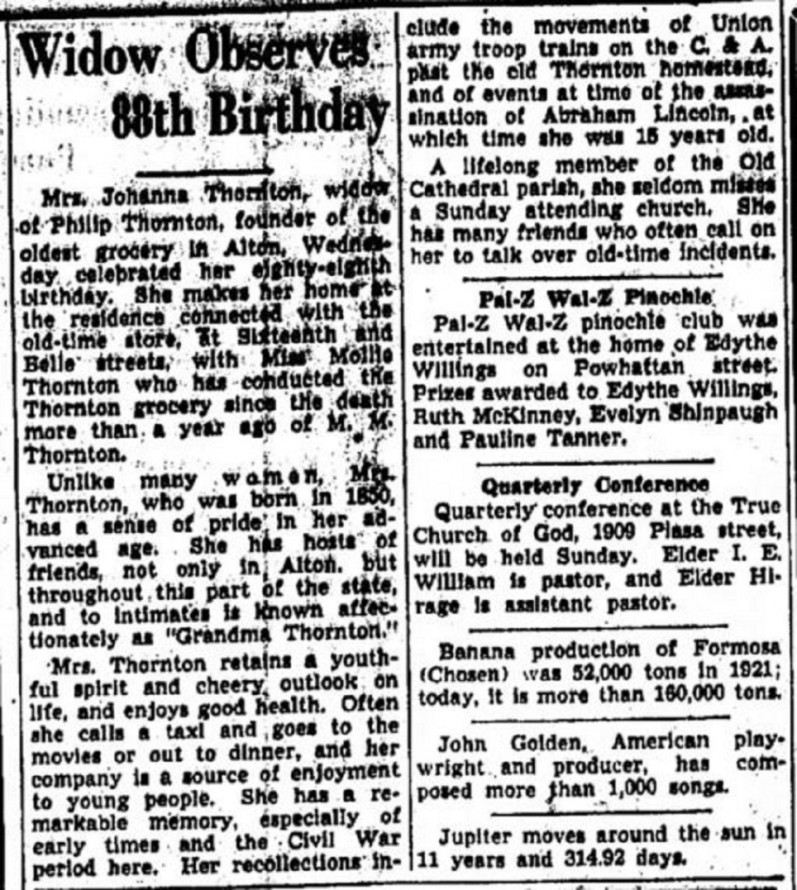 Napoleon Boniface Thornton was a grandson to Philip Thornton, a brother of my 3rd great-grandfather, James Patrick Thornton.
Napoleon Boniface Thornton was a grandson to Philip Thornton, a brother of my 3rd great-grandfather, James Patrick Thornton.
Even though he isn’t in my direct line, this is one of my favorite finds.
He wrote home to his parents and gave such a beautiful description of his experiences heading off to war “Over There” in 1918. It’s a great read for anyone interested in WWI history. Enjoy!
6 May 1918 issue of the Alton Evening Telegraph, Alton, Madison county, Illinois
BONNIE THORNTON WRITES FROM FRANCE
Alton Boy, Now in Service “Over There” Tells Parents of Experiences in Trip Across The Ocean.
Attorney and Mrs. J.P. Thornton of 305 Prospect street have received the following letter from their son, Napoleon B. Thornton, who left Camp Merritt, New Jersey, with a lot of Chicago boys last month. They are now in France and have been assigned to the artillery branch of the service.
An Atlantic Port,
March 14, 1918.
My Dear Parents:
The shrill notes of the bugles echoed through our camp at 1 o’clock this morning, and jumping from our cots after only a few hours of slumber, the last on American soil for those of us who may never return, we scrubbed and cleaned up our quarters and then partook of a good breakfast. We know it was our last breakfast on this side of the water and the boys certainly did it ample justice. It was a hilarious bunch, believe me, and they were all glad at the prospect of moving at last to the front to grapple with the Huns after so many months of arduous training in the camps we were leaving behind. At 4 o’clock we fell into line and marched away in a driving rain, that beat viciously into our faces and after a stunt of several miles a long railroad train hauled us away to the seaport.
In a few hours we were all safe on board the big steamship (I must not give her name) that was destined to carry us to sunny France. Of course we did not know just where we were going – it might be to England first , but we were soon on our way. Standing on the top deck of our huge dark grey transport, I watched, interestedly , the sailors rushing about at their tasks, the officers shouting their commands and the great steam cranes swinging back and forth loading the ship. All was bustle and hurry but no confusion. Every man of the crew seemed to be expert in his line of duty. He knew just what he had to do and did it perfectly. Make haste seemed to be the motto and yet everything done was like clock work percision. One could not help thinking what , if after all this effort was worth the while, what if all labor was to come to naught, if it should end swiftly in contact with a torpedo, a sudden dive to the bottom by our gallant ship all all of us on board floating around in life preservers in the ice cold water of the Atlantic struggling to keep from a watery grave. All the boys seemed to enjoy the scene and were as happy as larks.
Shouts and merry laughter made the welkin ring. Many jokes were cracked and there was lots of real wit in the crowd, likewise some grumbling occasionally and just a little profanity now and then from some fellow, who suddenly, got sore because something did not exactly suit him. It was a great sight to see the little tugs darting in and out among the giant greyhounds flying the Stars and Stripes near the pier. Then, just before our departure a band of our noble American women, Red Cross ladies – God bless them – came aboard with refreshments and bade us bon voyage. Hot coffee and sandwiches was the bill of fare and then for dessert – cigarettes.
At last everything was ready and our big transport swung away from the pier and turned her prow eastward and we began to wonder what out big guns on board would do to the sneaking, cowardly submarine that dared show its periscope in our pathway before our trip ended.
Soon the shores of our beloved country receded from our vision and as every boy stood there silently on the deck casting a last fond lingering look at the land of his birth, he muttered a farewell and brushed away a tear as thoughts reverted to the loved ones at home whom he may never see again in this life. But while the parting was sad for all of us we were consoled by the thought that when this cruel war is over and we come marching home again the world will be safe for democracy for all future time. That the cause of righteousness will be fully vindicated and that as at the close of the great Civil War the grand army of the Republic marched down Pennsylvania Avenue in the National Capital victorious, so we, too, shall have the pleasure of doing the same. And on that glorious day all over the land our beloved embled of liberty:
“The Star Spangled Banner in triumph shall wave,
O’er the land of the free and the home of the grave.”
Here are the notes I jotted down in my diary, during our trip across the big pond:
First Day – All the boys safely on board. At 5 p.m. our transport heads down the bay to the open sea. The March wind blows cold on the decks. We are all in the best of spirits but realizing that we are taking the most serious step of our lives, in all probability. We get our ship orders. Mine instructs me to go to raft. No one in case of disaster and we should have to abandon ship.
Second Day – The sea is pretty rough today. No land in sight. The boys are nearly all seasick. It is amusing to see them strung along the taffrail “heaving the anchor.” I seem to be immune. Am feeling fine and well enough to jump overboard and swim France. Perhaps I may get a chance if a beastly “sub” hags us.
Third Day – Sunday and it is St. Patrick’s Day. Shamrocks and sprigs of green are visible here and there among the boys. The weather is fine and the sun is shining gloriously down upon us. A fair warm wind prevails and the ocean looks like a mirror of silver. It sat for several hours on the main deck reading Hall Caine’s “The Bondman.” The boys are all better again and our appetites are growing enormously. The Y.M.C.A. people furnish us plenty of books to read before leaving. We had “abandoned ship drill” today and it don’t take the boys very long to find their places, when the general alarm bell and the bugles sound. Every fellow makes for the raft assigned to him.
Fourth Day – Everybody rolled out of their bunks bright and early this morning and we had a fine breakfast. Steaming hot Java, bacon, liver and fried potatoes, bread and rolls. The grub is good and plenty of it. My! how those fellows can eat. This sea business makes one hungry all the time. I am in charge of four staterooms and have to see that they are kept clean. Warm sun and a smooth sea. A beautiful day at sea. Everybody enjoys it. We have two Y.M.C.A. men on board and our movie show takes place in the ship’s mess hall every evening at 8 o’clock.
Fifth Day – A coldl raw wind blows today and the ship is rolling and tossing considerably for the sea is rough. Quite a rainfall and the boys had to keep below in quarters. Reading, cards and other games are our methods of killing time. All well on board. Weather changeable.
Sixth Day – Rumors making the rounds that we are near the war zone and the boys begin to look serious. We are lectured today by our lieutenant. He says when we reach the zone we must be ready to abandon ship at a moment’s notice. We must not thrown anything overboard as it might betray our position to the enemy. Told us all how to behave ourselves in France so that we will be a credit to our country and the flag we are to fight under. No booze for anybody and as to the girls – forget that there are such creatures on the planet.
Sixth Day – Weather fair and we seem to be making good time judging from the noise of the machinery below decks. I stood up on the top deck today looking down at those wild sea waves, for it was very rough and wondering if we will be lucky enough to give the “subs” the slip when we get into their haunts or if we shall meet the fate of the Tuscanis. That icy sea water don’t look at all inviting for an involuntary bath.
Seventh Day – A beautiful day at sea. Fair weather and the sea is as calm as Lake Michigan on a summer day. We had plenty of music and sang songs all day in quarters or paraded around the decks. Have orders to sleep from now on in our clothes with life preservers in reach as we are on the verge of the war zone.
Seventh Day – Another lovely day. Fine breakfast at 8 o’clock. All well on board and all the boys in the best of spirits. Tonight we will be in the war zone. The meals furnished us are first class.
Eighth Day – Very stormy weather today. The wind blew fiercely through the rigging and the ocean was on a rampage. Our good ship rolled and it was all a fellow could do it keep on his feet. Finally a big wave came tumbling overboard and a lot of us got a good ducking but nobody went overboard when it receded. Bad weather all day.
Ninth Day – In the war zone. Weather very bad and the sea violently rough. The ship is heaving around a good deal and we are surely being “rocked in the gracle of the deep.” There was considerable excitement for a while this morning, it having been reported that a fire had broken out in the hold. However, if the report was true they must have put it out quickly for we heard no more about it during the day. We are getting tired of this monotomous sea journey and all are anxious to see land once more even though it is not our native shore.
Tenth Day – it is Sunday and we have religious services on board. Clearing weather and the day turns out to be the finest we have had since leaving. We are now in what is called the graveyard of the Atlantic, the place where the murderous submarines have done most of their dirty and cowardly work. Everybody on the alert. It is some sight to stroll around this top deck and see our big guns, fore and aft, ready for action. The gun crews are in their places and the lookouts are scanning the horizon with their big telescopes looking for any suspicious object that may bob up on the surface. All well on board.
Eleventh Day – Nearing France. We are now in the Bay of _______. As they say in Kaiserland, “Est ist verboten, ” to mention the name so you can go to guessing. We are in more danger of attack now than during the last few days as the “subs” have a habit of lurking as close to land as they possibly can with safety. About 7:39 this morning there was a big commotion on board. A small black object appeared at quite a long distance away from us. It was just a small speck, scarcely visible to the naked eye. Our lookouts reported that it might be a periscope or a box concealing one as the Germans resort to such tricks to catch the unwary. You should have seen our gunners get busy. In a few minutes our forward gun spoke with a mighty roar and a shell flew towards the black object. The sound of that gun called home to every boy on board the fact that he was certainly in the big world war. When that shell struck the black object vanished. It was a bull’s eye shot and the captain of the gun crew reported that it was a large, black sea gull and that he saw the feathers fly when that shot struck home. Believe me, old Uncle Sam has surely got some gunners on the job. If they are as good as this bunch the Huns will certainly have to lay pretty low to escape the sea gull’s fate. Rumored that we are nearing land.
Twelfth Day – Morning dawns and the sun rises majestically on a calm, tranquil sea. The weather is fair and warm for the latter part of March. There is great commotion on board for we have been notified that our journey is near an end and that in a few hours it will be completed. We are ordered to pack our life preservers away and straighten up our bunks and get our kits ready for disembarking. All the boys are on the qui vive and glad that the long voyage is ending. We finish our last meal on the ship and everybody is parading the deck when suddenly “Land ho!” is bawled out from the crow’s nest and there is a grand rush for the port side railing. Away off to the east a dark line is just visible to the eye above the horizon. Europe at last. It certainly looks like as if we have put one over on the “subs” and that our gunners are not going to try their skill again on this trip. A few hours later our big ship grates her keel in a French port. Every man is ready to move. The gang planks are thrown out. Our voyage is safely ended. The bugles sound. We fall in and march to terra firma. At last we are on soil already made sacred by the blood of fallen comrades. The land of my namesake, the great Napoleon; the land of the brave, like poor Belgium scourged by the demons of war; the Kaiser’s minions, those cruel, heartless Huns. France glorious La Belle France!
More anon, your son,
BONNIE





 DEATH OF MRS. LOUIS HARRIS – Mrs. Kate Poettgen Harris, a native of this city, wife of Mr. Louis Harris, died shortly after 12 o’clock yesterday, at the family residence on Tenth street, after an illness lasting but a few hours, at the age of thirty-five years and six months. Her husband, who was working at the break on the Jacksonville division of the C. & A. railway, near Riverdale, was notified by telegraph, but failed to get home in time to see his wife alive, although kindly furnished an engine for the trip by Roadmaster Huskinson. Mrs. Harris, besides her husband, left three small children, with many relatives and friends to mourn her sudden death. The funeral will take place from the Cumberland Presbyterian church at 2 o’clock tomorrow afternoon.
DEATH OF MRS. LOUIS HARRIS – Mrs. Kate Poettgen Harris, a native of this city, wife of Mr. Louis Harris, died shortly after 12 o’clock yesterday, at the family residence on Tenth street, after an illness lasting but a few hours, at the age of thirty-five years and six months. Her husband, who was working at the break on the Jacksonville division of the C. & A. railway, near Riverdale, was notified by telegraph, but failed to get home in time to see his wife alive, although kindly furnished an engine for the trip by Roadmaster Huskinson. Mrs. Harris, besides her husband, left three small children, with many relatives and friends to mourn her sudden death. The funeral will take place from the Cumberland Presbyterian church at 2 o’clock tomorrow afternoon. Widow Observes 88th Birthday
Widow Observes 88th Birthday

